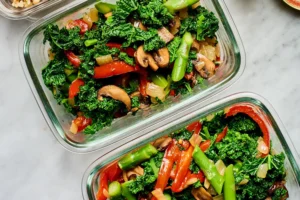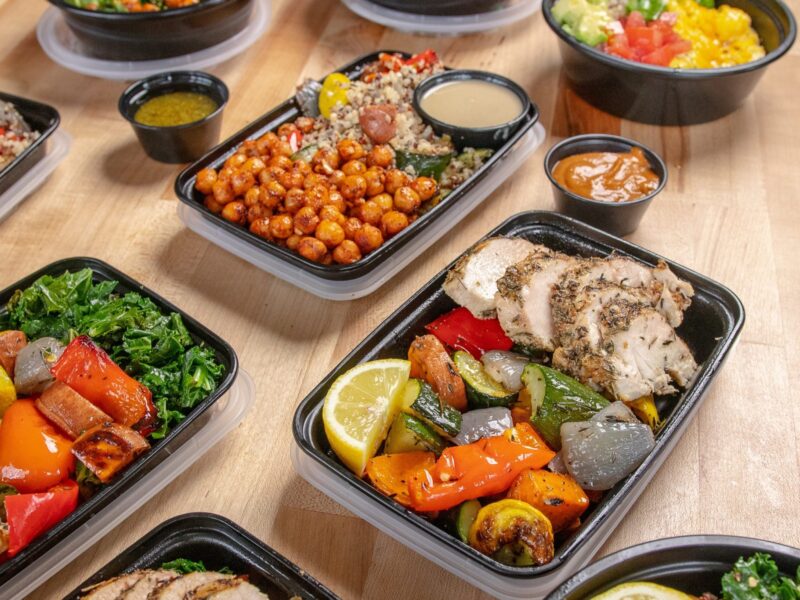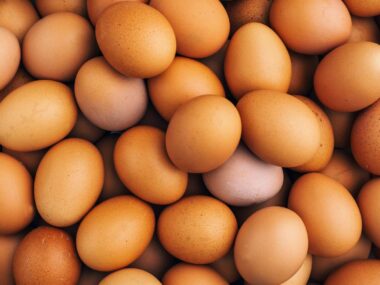In today’s fast-paced world, maintaining a healthy diet can often seem like a daunting task. Between work, family commitments, and social obligations, finding the time to prepare nutritious meals can be challenging. However, with a little planning and preparation, you can set yourself up for success and ensure you have healthy meals ready for the weekend. This guide will provide comprehensive insights into meal prepping, focusing on planning, tips, and recipes to help you maintain a nutritious diet through the weekend.

The Importance of Meal Prepping
Health Benefits
- Improved Nutrition: Prepping meals in advance allows you to control ingredients, portion sizes, and nutritional content, leading to healthier eating habits.
- Weight Management: Having pre-portioned, healthy meals ready can prevent overeating and reduce the temptation to indulge in unhealthy foods.
- Consistent Energy Levels: Balanced meals provide sustained energy throughout the day, preventing energy dips and cravings.
- Stress Reduction: Knowing that you have healthy meals ready reduces the stress of daily meal planning and cooking.
Time and Cost Efficiency
- Saves Time: Preparing meals in bulk can save time during the week, allowing you to focus on other important tasks.
- Reduces Food Waste: Planning meals helps in buying only what you need, reducing the likelihood of food spoiling and going to waste.
- Cost-Effective: Buying ingredients in bulk and cooking at home is generally cheaper than eating out or ordering takeout.
Convenience and Consistency
- Convenience: Having meals ready to eat means less cooking and cleaning during the week.
- Consistency: Meal prepping helps maintain a consistent eating schedule, which is beneficial for metabolism and digestion.
Getting Started with Meal Prep
Assessing Your Needs
- Determine Your Goals: Identify your health and nutrition goals, whether it’s weight loss, muscle gain, or simply maintaining a balanced diet.
- Evaluate Your Schedule: Consider your weekly schedule to determine how many meals and snacks you’ll need to prep.
- Assess Dietary Preferences: Take into account any dietary restrictions, allergies, or preferences you or your family members may have.
Planning Your Meals
- Choose Recipes: Select a variety of recipes that are nutritious, easy to prepare, and align with your dietary goals.
- Create a Menu: Plan your menu for the weekend, including breakfasts, lunches, dinners, and snacks.
- Make a Shopping List: Based on your menu, create a detailed shopping list to ensure you have all the necessary ingredients.
Shopping Tips
- Shop Smart: Buy in bulk where possible, especially for non-perishable items like grains, legumes, and frozen vegetables.
- Seasonal Produce: Choose seasonal fruits and vegetables, as they are often fresher, more nutritious, and cost-effective.
- Protein Sources: Include a variety of protein sources such as lean meats, fish, beans, lentils, and tofu.
Kitchen Essentials
- Storage Containers: Invest in good quality, airtight containers of various sizes for storing your prepped meals.
- Cooking Equipment: Ensure you have essential cooking tools like a good knife, cutting board, pots, pans, and baking sheets.
- Labeling Supplies: Use labels or markers to date and identify the contents of each container.
Meal Prep Strategies
Batch Cooking
- Cook in Bulk: Prepare large quantities of staple foods like grains, proteins, and vegetables that can be used in multiple meals.
- Mix and Match: Create versatile components that can be combined in different ways to avoid meal monotony.
Freezing and Storing
- Freeze in Portions: Freeze meals in individual portions for easy reheating and to maintain freshness.
- Proper Storage: Use freezer-safe containers or bags to prevent freezer burn and preserve the quality of your meals.
Time Management
- Set Aside Time: Dedicate a specific time each week for meal prepping, such as Sunday afternoon.
- Efficient Cooking: Use time-saving appliances like slow cookers, pressure cookers, and food processors.
Healthy Weekend Meal Ideas
Breakfast
- Overnight Oats
- Ingredients: Rolled oats, almond milk, chia seeds, honey, fresh berries.
- Preparation: Combine all ingredients in a jar, refrigerate overnight, and enjoy in the morning.
- Vegetable Frittata
- Ingredients: Eggs, spinach, bell peppers, onions, feta cheese.
- Preparation: Whisk eggs, mix in chopped vegetables and cheese, pour into a baking dish, and bake at 350°F for 20-25 minutes.
- Smoothie Packs
- Ingredients: Frozen fruits, spinach, protein powder, almond milk.
- Preparation: Pre-portion fruits and spinach in freezer bags. In the morning, blend with protein powder and almond milk.
Lunch
- Quinoa Salad
- Ingredients: Cooked quinoa, chickpeas, cherry tomatoes, cucumbers, feta cheese, olive oil, lemon juice.
- Preparation: Combine all ingredients in a large bowl, toss with olive oil and lemon juice.
- Chicken Wraps
- Ingredients: Grilled chicken breast, whole wheat tortillas, lettuce, avocado, salsa.
- Preparation: Slice chicken and assemble wraps with lettuce, avocado, and salsa.
- Lentil Soup
- Ingredients: Lentils, carrots, celery, onions, garlic, vegetable broth, diced tomatoes.
- Preparation: Sauté vegetables, add lentils and broth, simmer until lentils are tender.
Dinner
- Stir-Fry
- Ingredients: Lean beef or tofu, broccoli, bell peppers, snap peas, soy sauce, garlic, ginger.
- Preparation: Stir-fry protein and vegetables, season with soy sauce, garlic, and ginger. Serve with brown rice.
- Baked Salmon
- Ingredients: Salmon fillets, lemon slices, dill, olive oil.
- Preparation: Place salmon on a baking sheet, drizzle with olive oil, top with lemon and dill, bake at 400°F for 15-20 minutes.
- Stuffed Bell Peppers
- Ingredients: Bell peppers, ground turkey, quinoa, black beans, corn, tomato sauce, cheese.
- Preparation: Hollow out peppers, mix filling ingredients, stuff peppers, bake at 375°F for 30-35 minutes.
Snacks
- Hummus and Veggie Sticks
- Ingredients: Homemade or store-bought hummus, carrot sticks, celery sticks, cucumber slices.
- Preparation: Portion hummus into small containers and pair with pre-cut veggies.
- Greek Yogurt and Berries
- Ingredients: Greek yogurt, mixed berries, honey.
- Preparation: Portion yogurt into small containers, top with berries and a drizzle of honey.
- Energy Balls
- Ingredients: Rolled oats, peanut butter, honey, flaxseeds, dark chocolate chips.
- Preparation: Mix all ingredients, roll into balls, refrigerate until firm.
Tips for Maintaining Healthy Habits
Consistency and Flexibility
- Stick to Your Plan: Follow your meal prep plan but be flexible to accommodate changes or unexpected events.
- Regular Review: Periodically review and adjust your meal prep routine to keep it aligned with your goals and preferences.
Involving Family and Friends
- Cooking Together: Involve family members in the meal prep process to make it a fun and collaborative activity.
- Sharing Recipes: Share your meal prep recipes and ideas with friends to inspire and motivate each other.
Staying Motivated
- Track Progress: Keep a food journal to track your meals, progress, and how you feel.
- Celebrate Successes: Reward yourself for sticking to your meal prep plan with non-food rewards like a relaxing activity or new workout gear.
Overcoming Challenges
- Time Management: If time is a constraint, start with prepping just a few meals or snacks and gradually increase as you get more comfortable.
- Budget-Friendly Options: Look for sales, use coupons, and buy in bulk to keep your meal prep budget-friendly.
- Staying Inspired: Regularly look for new recipes and meal prep ideas to keep things exciting and prevent burnout.
Conclusion
Meal prepping is a powerful tool for maintaining a healthy diet and managing your time efficiently. By planning and preparing your meals ahead of time, you can ensure you have nutritious options ready for the weekend, reducing stress and making it easier to stick to your dietary goals. Whether you’re new to meal prepping or looking to refine your routine, the tips and recipes provided in this guide will help you achieve meal prep success. Embrace the process, stay consistent, and enjoy the benefits of a well-planned and healthy diet.










